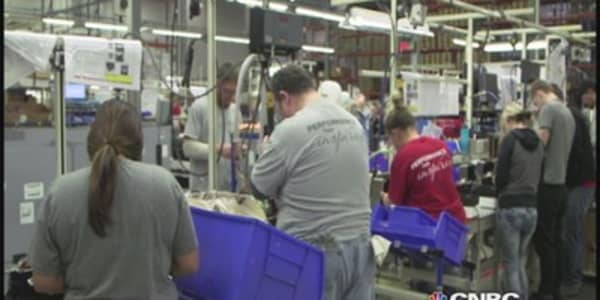Germany's network of established medium-sized global companies known as the Mittelstand has long been credited with driving the country's economy. But can the model be used in the U.K.? And can this "Brittelstand" survive without government help?
Small and medium-sized companies play as important a role to the U.K. as they do in Germany. Figures from the U.K. government state that they employed 14.4 million people in the U.K. in 2013. Furthermore, the European Commission's performance review of U.K. SMEs this year estimated their gross value added at 473 billion euros ($595.4 billion) or 49.8 percent of the U.K. economy.
There are nearly 5 million small and medium-sized businesses in the U.K – companies with fewer than 250 employees and a turnover of under £12.9 million ($20.6 million) are small, family-owned affairs.
One of these businesses is Hargreaves Foundry, a family-owned iron works in Yorkshire making iron castings and products for customers ranging from the construction and architectural industries to artists including Anthony Gormley.
The firm has been family-owned since the 1980s and despite going through tough times during the financial crisis – particularly as it supplied drainage materials to the construction industry – it is still in business thanks to the firm's ability to adapt, according to its marketing manager.
"The Foundry has survived because it's been prepared to diversify its business," Richard Hall told CNBC. "You have to be positive and you have to look for the opportunities out there. As a smaller business you've also got to be prepared to move quickly - being able to do that is an advantage that not many big companies have."
Read more: Family businesses in this city are suffering
SMEs like Hargreaves Foundry could "do with less interference from the government and the faffing about with the increasing layers of bureaucracy," Hall said, adding that British businesses needed to be left to "get on with it."
All too aware of the importance of SMEs to the economy the U.K. government has vowed to support smaller businesses. At the start of 2013, Minister for Trade and Investment Lord Livingston pledged to create a "Brittelstand," a network of U.K. SMEs that export like their German counterparts. Currently only one in five of the U.K.'s SMEs currently export, according to the Confederation of British Industry (CBI), showing that many smaller businesses are missing the rewards of foreign markets and consumers.
Pledging every mid-sized business in the U.K. "tailored trade advice and an intensive programme of support to help them start exporting," the government says it will offer support through UKTI, a non-ministerial government department. With its help, the department website states "on average mid-sized businesses can increase their sales by £1.8 million."
One British firm that has used UKTI to make inroads into foreign markets is the Brompton Bicycle company. Famous for its lightweight folding bike, Bromptons have been production in the U.K. since 1981. Now, it produces up to 45,000 bicycles a year, employs 230 people and exports to 44 markets worldwide. In 2013, the company's turnover was £27.5 million.

"U.K. SMEs definitely need to think about exporting abroad. It's a vulnerable market [in the U.K.] and we live in a global world. Frankly, you're a muppet if you don't export because if you have 20 markets, you're less fragile," Brompton's managing director Will Butler-Adams told CNBC.
"We saw that the U.K. was a very seasonal market and there was a risk that if the economy took a downturn, so would we. So we saw the value in diversifying. It was a long-term strategic approach."
The company has used UKTI's advisory service and participated in trade trips to South America and Asia designed to promote British brands and businesses. "Wherever we can, we will use UKTI, they're a great resource [but I think] people are a bit obsessed with what the government does for businesses."
While the government had some role to play in encouraging businesses to expand abroad, Butler-Adams said anyone who expected the government to do all the hard work for them was "mad."
"The starting point is you as a company with a vision. You have to get on with it and do it yourself."
- By CNBC's Holly Ellyatt, follow her on Twitter @HollyEllyatt





